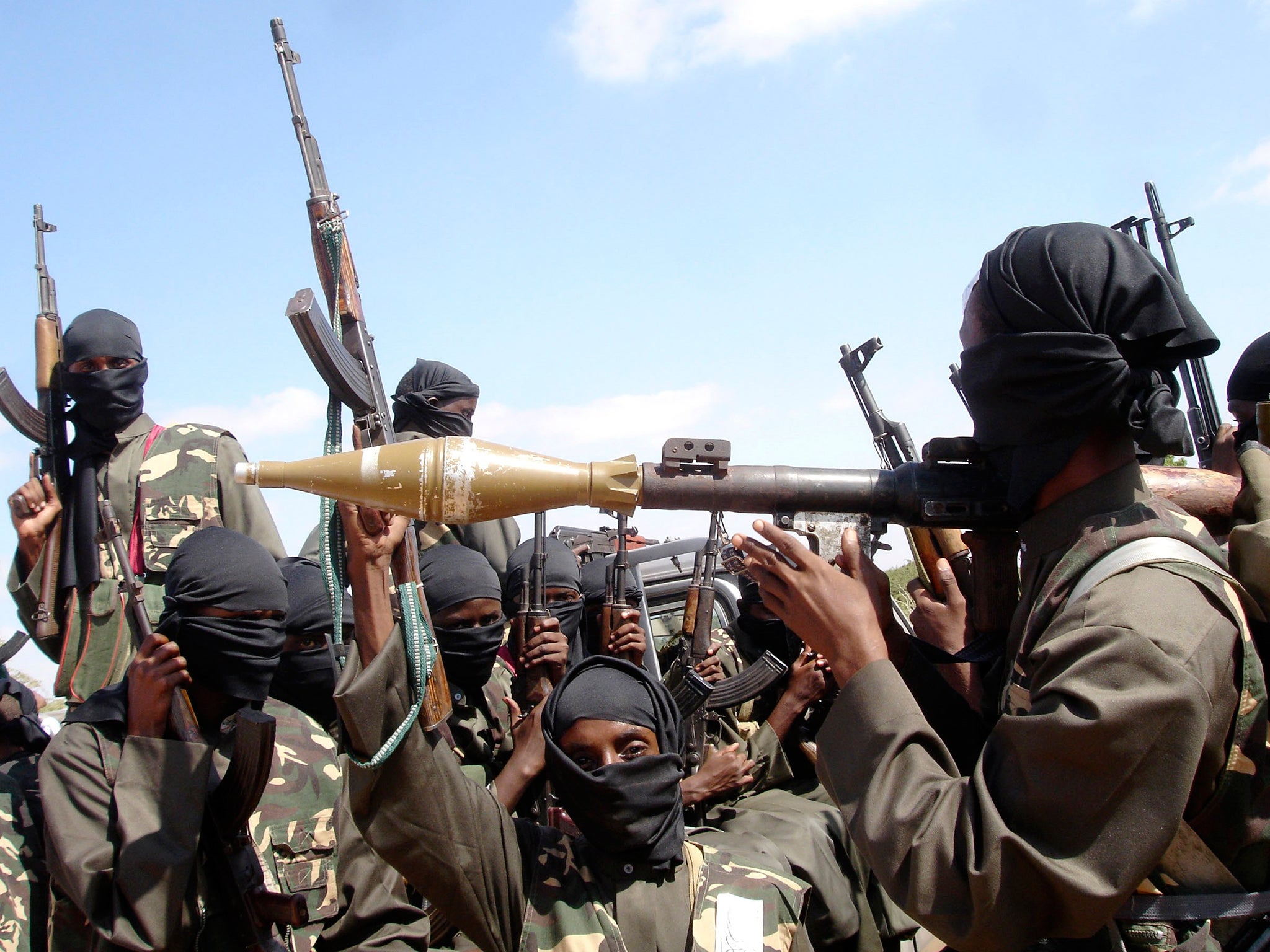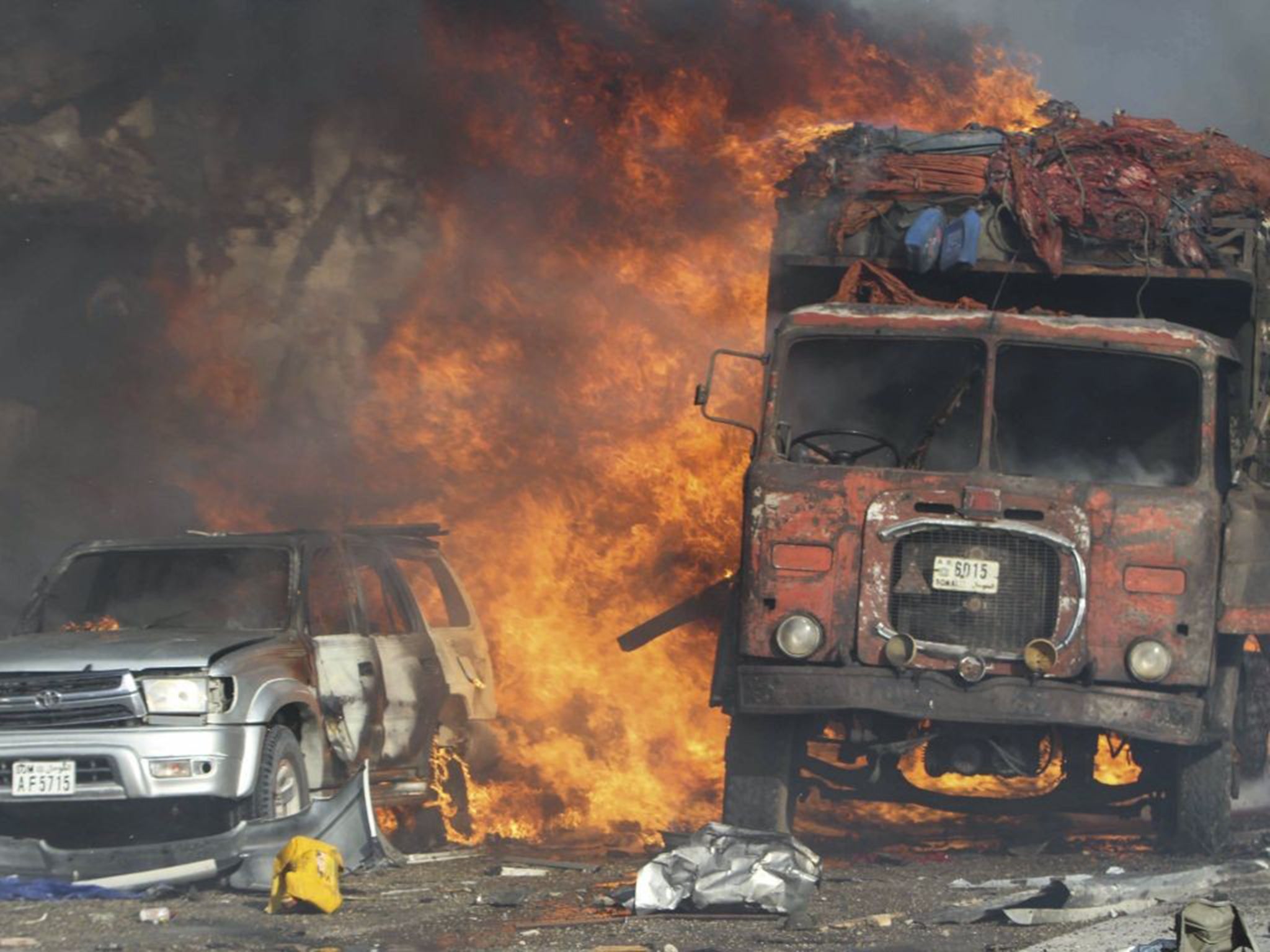Al-Shabaab: Who are the East African jihadi group and what are their goals?
Islamic extremists present in southern Somalia and known for violent suicide attacks on Mogadishu and neighbouring Kenya
Your support helps us to tell the story
From reproductive rights to climate change to Big Tech, The Independent is on the ground when the story is developing. Whether it's investigating the financials of Elon Musk's pro-Trump PAC or producing our latest documentary, 'The A Word', which shines a light on the American women fighting for reproductive rights, we know how important it is to parse out the facts from the messaging.
At such a critical moment in US history, we need reporters on the ground. Your donation allows us to keep sending journalists to speak to both sides of the story.
The Independent is trusted by Americans across the entire political spectrum. And unlike many other quality news outlets, we choose not to lock Americans out of our reporting and analysis with paywalls. We believe quality journalism should be available to everyone, paid for by those who can afford it.
Your support makes all the difference.Al-Shabaab is the deadliest jihadi group in sub-Saharan Africa, largely operating in Somalia but known for brutal attacks on neighbouring Kenya.
Founded in 2006, the group – whose name translates from Arabic as the “The Youth” or “Mujahideen Youth Movement” – began as the militant arm of the Islamic Courts Union (ICU), an alliance of hard-line Sharia courts in southern Somalia who sought to rival the Transitional Federal Parliament for control of the country.
Al-Shabaab has long since spun off from the ICU and aims to overthrow the Western-backed successor Federal Parliament on its own, carrying out vicious suicide bombing attacks and other acts of brutality against “enemies of Islam” among the Horn of Africa’s Christian and Sufi Muslim population. Committed to ultra-conservative Wahhabi Islam, al-Shabaab intends to run Somalia in accordance with strict Sharia principles.
Al-Shabaab initially won popular support by pledging to bring security to a nation that has not had a stable government in 20 years, before losing face when its rejection of international aid made tough conditions worse for their people when the land was struck by drought and famine in 2011.
Al-Shabaab was driven out of Mogadishu that same year by troops from the African Union – a military alliance comprised of soldiers from Uganda, Kenya, Ethiopia and Burundi – and out of the port city of Kismayo in 2012, a huge blow since its cut from the charcoal trade through the docks had been a key source of income.
The group has been affiliated with al-Qaeda since 2012 when its previous leader, Ahmed Abdi Godane, pledged “obedience” to his counterpart Ayman al-Zawahiri in 2012. Gobdane was subsequently killed in a US drone strike and al-Shabaab is now led by Ahmad Umar, also known as Abu Ubaidah. He has between 7,000 and 9,000 foot soldiers at his command.
The militia is also thought to have ties to al-Qaeda in Islamic Maghreb and Boko Haram in Algeria and Nigeria respectively.
Al-Shabaab does not have links with Isis, however, having rejected them, a decision that caused a rift among its ranks and led to the formation of a splinter faction, Jabha East Africa, which recognises Isis leader, Abu Bakr al-Baghdadi, as the “rightful Khalifa of all Muslims”.
Having brought carnage to the region over the last decade, al-Shabaab is now recognised as a terrorist organisation by the UK, the US, Norway, Australia, New Zealand and the UAE.
One of its earliest atrocities was the bombing of a restaurant in Kampala, Uganda, on 11 July 2010, designed to coincide with the Fifa World Cup Final between Spain and the Netherlands, revenge for Uganda’s operations against it as part of the African Union. Seventy-four people were killed watching the game that night.
Kenya has been the victim of the majority of al-Shabaab’s assaults outside of Somalia, notably the attack on Nairobi’s upmarket Westgate shopping centre in 2013 that killed 62 civilians, five soldiers and four masked gunmen and in which British jihadi Samantha Lewthwaite, fancifully nicknamed the White Widow, was rumoured to have been involved.

The Islamists have also targeted the resort town of Mpeketoni, teachers travelling by coach, quarry workers and the country’s Garissa University, where 148 were killed in 2015, most of whom were Christian students identified among the 700 taken hostage.
When the group ambushed another bus travelling south from Mandera to Nairobi later that same year, their attempt to employ the same tactic was frustrated when the passengers refused to comply with orders that they divide into Christian and Muslim groups, an act of brave defiance that meant the death toll from the incident was reduced to two.
The group also targeted a Kenyan military base near El Adde in Somalia in January 2016, killing 180 soldiers.

Unquestionably its worst attack was the suicide truck bombing it carried out outside Mogadishu’s Safari Hotel on 14 October 2017, the most devastating in Somalia’s history, which destroyed several nearby blocks and left 587 people dead and 316 injured among the rubble.
This was followed by a 12-hour siege at the Nasa-Hablod hotel in the same city two weeks later, when 25 more were killed after a car bomb blew open the resort’s gates and damaged the three-storey building, allowing gunmen to enter. A mother and her three children, one of whom was a baby, were shot in the head during the incident.
In its attempts to enforce fundamentalist religious law, al-Shabaab has become notorious for stoning “sinners” to death. Mother-of-eight Habiba Isak, 30, was executed in this manner in the town of Sakow in October 2017 after being accused of being unfaithful to her husband, as was Shukri Abdullahi, 30, in Lower Shabelle five months later, charged with bigamy.
The group has also severed the hands of thieves and carried out beheadings in the pursuit of “justice”.
Al-Shabaab’s most recent attacks took the form of a car bomb detonated outside of parliament in Mogadishu in March 2018 and another outside the interior ministry four months later, the latter seeing civil servants leap from windows to escape the gun battle raging within its corridors. Thirteen died in the two incidents together.
All this is of extra concern to the international community given that Somalia’s inexperienced domestic security forces are due to assume control of the country’s peacekeeping responsibilities from the 21,000-strong African Union by 2020.
The US, which retains 500 troops in Somalia, is particularly anxious about the imminent changing of the guard.
Donald Trump approved a Pentagon plan to increase operations against al-Shabaab in March 2017 and the US military duly carried out 30 air strikes in the country, many by drone, hoping to further weaken the extremists before the handover comes to pass.
One of the strangest aspects of the group’s outlook is its commitment to environmental issues. Al-Shabaab recently made headlines for prohibiting single-use plastic bags on the grounds that they represent “a threat to people and livestock”, an announcement made through its main propaganda outlet Radio Andalus, broadcasting in Somali, Arabic, Swahili and English.
Al-Shabaab has previously spoken out against Somalia’s logging industry for toppling rare trees and denounced Barack Obama for his failure to do more to tackle climate change during his time in office, leading the group to be mocked, with gallows humour, as East Africa’s “eco-friendly jihadis”.

Join our commenting forum
Join thought-provoking conversations, follow other Independent readers and see their replies
Comments